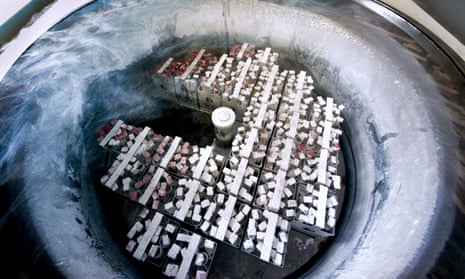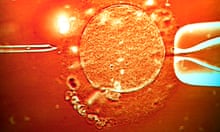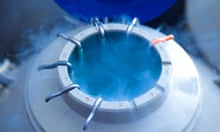For women intending to undergo IVF treatment using frozen eggs, the younger they are when they are frozen the greater the chance of a successful pregnancy, according to a report by the UK’s independent fertility regulator.
Most IVF treatment cycles use fresh eggs, but a very small number use eggs that have been frozen and thawed. It can, for example, be especially beneficial for cancer patients who decide to freeze their eggs before undergoing chemotherapy.
The report by the Human Fertilisation and Embryology Authority (HFEA) looked at data from UK fertility clinics from 2010 to 2016, and found that the key factor for successful pregnancies is the age at which women freeze their eggs.
If women freeze their eggs when they are younger than 35, the chances of a successful pregnancy after IVF become higher than the natural conception rate as they get older – but the current average age at which women have their eggs frozen is 38. Women’s age when the eggs are thawed has little impact.
In the report, the HFEA cautions against freezing eggs over the age of 40, since “the likelihood of a pregnancy from these eggs would be very slim”.
Since 1999, when the first baby was born from the technology, the number of egg-freezing cycles in the UK has increased each year, and it has more than doubled since 2013. In 2016, 156 babies were born from frozen eggs.
But while egg freezing is increasing across the UK, it is still a rare procedure; just 178 women had the treatment in 2016.
“The report hints at an emergent technology which is a boon for those who are undergoing chemotherapy,” said Alastair Sutcliffe, a professor of general paediatrics at University College London. “But it’s an invasive procedure and it’s not zero risk for the patient.”
“Fertility is not just about eggs, it’s about the state of the person as a whole … the chances of pregnancy, as stated in the report, are still low, particularly when the woman’s own eggs are frozen.”
In 2016, egg freezing was successful in 18% of cases, significantly below the 26% overall success rate of IVF. The chances of successful birth increased to 30% when the frozen eggs came from a donor. “The reason for that is that the donor eggs are from younger women,” said Sutcliffe.
“Egg-freezing technology in the right hands should be able to give success rates almost as good as conventional IVF,” said Simon Fishel, the founder of the Care Fertility Group, an independent IVF provider.
“The HFEA data compares very well with the national average after conventional IVF in women under 35. If you are serious as a society or as a company offering egg freezing to staff or as an individual, the sooner you can freeze your eggs – between about 28 and 32 [years of age] – the higher the chances of success. The technology is good enough.
“Because only about 10-30% of eggs are able to make a baby, you probably need about 20 eggs stored in the bank if possible.”
If younger women are to freeze their eggs, the current law limiting the storage period to 10 years needs to be changed, according to Fishel. “The technology will change to become even better for women because we need it to,” he said. “Everyone who wants to have children and can’t should be helped.”










